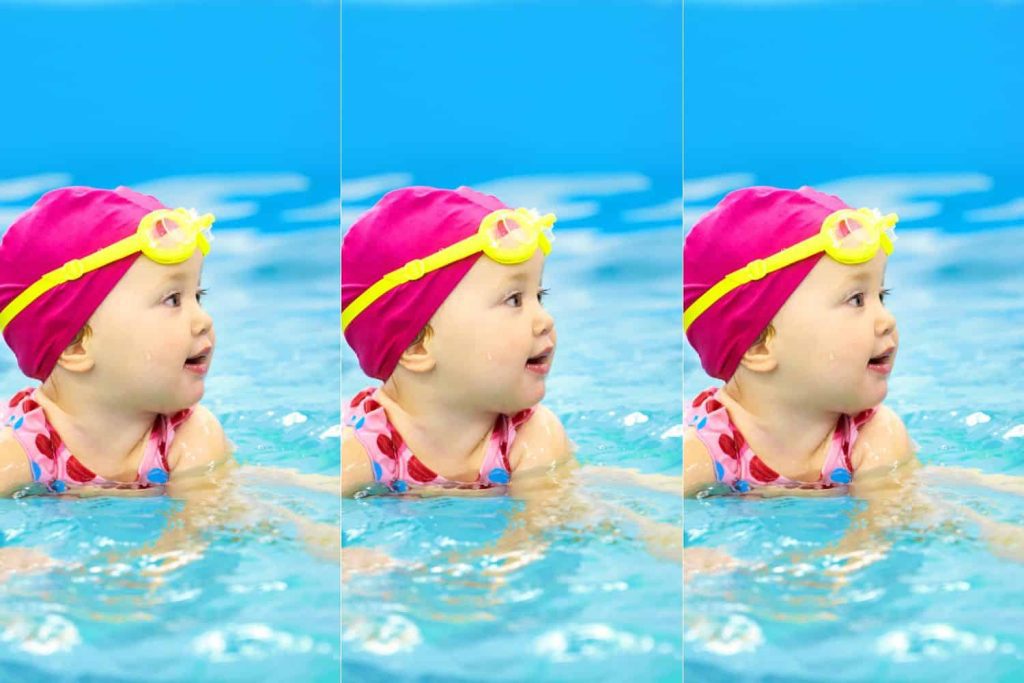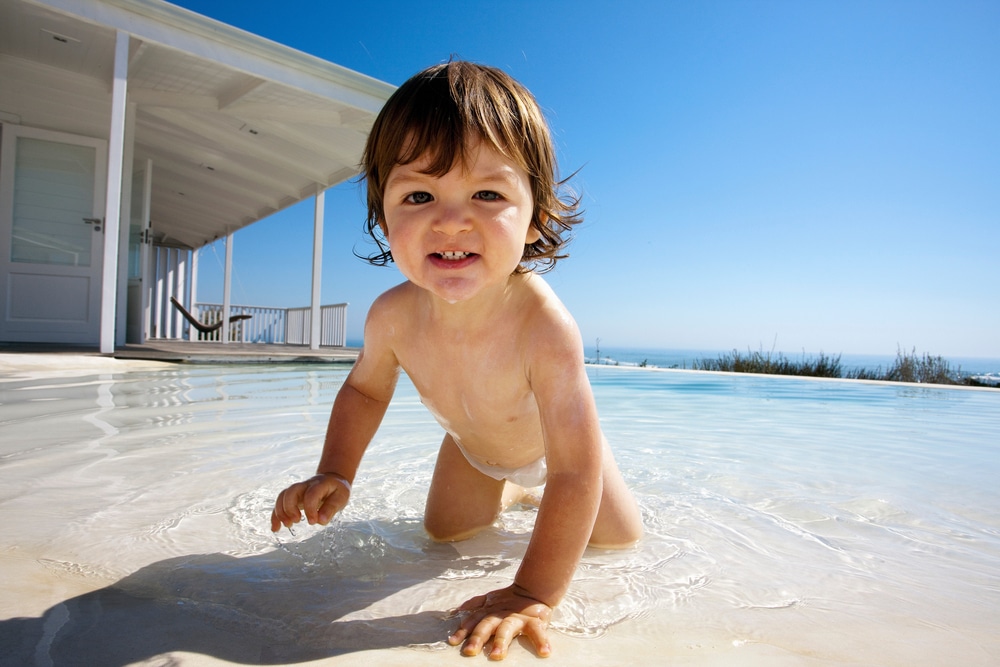Can babies wear regular diapers in the pool? There is no definitive answer, as the jury is still out on the safety of swimming with infants wearing diapers. However, you can take a few precautions to minimize your baby’s risk of getting wet and cold.
First, ensure your baby is properly fitted for a swim diaper and tested for leaks before jumping into the pool. If your baby leaks, place absorbent towels around her waist and between her legs to help contain the mess.
Second, be aware of the water temperature. Babies under 12 months old should not be in water temperatures above 86 degrees F (30 degrees C), while babies over 12 should stay no warmer than 94 degrees F (35 degrees C).
3 Reasons why Babies Shouldn’t Wear Regular Diapers in the Pool While Swimming:
1. Babies should not wear regular diapers in the pool because they can get wet and cold.
2. Diapers made for swimming pools are designed to be leakproof and waterproof, which is why they are a better option.
3. Regular diapers can cause leaks, making swimming difficult and tiring for the baby.
4. Leaks also create a dangerous environment for other pool users and the baby themself.
5. Swimming with a baby in regular diapers is not recommended, especially if they use a float or snorkel to keep them afloat while swimming.
6. Special swim diapers are available to protect the baby from getting wet and cold while swimming, but they will also keep them safe from leaks and spills in the pool water.
Regular Diapers Work Differently Compared To Swim Diapers:
Regular diapers are designed to absorb and hold liquid. Swim diapers, however, are specifically designed for swimming and keeping babies dry.
Swim diapers have an inner pad and a waterproof outer layer. The pad regulates drying time and prevents irritation. There are also snaps on the waistband to secure it and prevent leakage.
Swim diapers can be worn with or without a cover. A cover is optional but recommended because it helps keep the baby’s skin warm and comfortable in cold weather climates.
Can babies wear regular diapers in the pool? Regular diapers will not work well when used in the pool because they will leak if there is any leakage.

Do Swim Diapers Hold Urine?
Swim diapers are a type of cloth diaper that is worn by infants and young children while in the water. They are designed to be waterproof and leakproof, making them a popular choice for pool use.
There has been some debate among parents about whether or not swim diapers hold urine. The truth is that it depends on the particular diaper and on how much the baby drinks and urinates. Some swim diapers will hold more than others, but it’s always best to consult your pediatrician before using them in the pool.
Public and Private Facilities Won’t Allow Babies to Wear Regular Diapers in the Pool:
Recently, a California mother became outraged after she found that her five-month-old was wearing regular diapers in the pool. The woman, who wished to remain anonymous, said that she had been informed by public and private facilities where her baby was playing that babies cannot wear regular diapers in the pool. “I feel like I’m being discriminated against,” she said.
Some parents believe regular diapers can cause skin irritations and infections in infants. Others argue that keeping infants confined to changing areas is cruel when they can explore their surroundings and have fun in the water.
To prevent potential accidents, most facilities insist that babies wear swim diapers or special suits for swimming pools.
The Dangers of Recreational Water illnesses for your Baby and Others:
Can babies wear regular diapers in the pool?There are a few things to keep in mind when it comes to swimming with your baby. First, ensure they wear a swim diaper if they will be swimming. This will help prevent them from getting sick and will also keep them safe while you’re swimming with them.
If you choose to take them outside the pool and into the water, be sure they are wearing a life jacket as well. Swimming with a small child can be dangerous, even if they are properly supervised. Ensure you know what precautions to take to keep your little one safe and healthy!
Finding the Right Swim Diaper to Use for your Child:
Swim diapers are great for pool use because they keep your child dry and comfortable. However, here are a few things to remember when choosing the right swim diaper for your child:
- Ensure the diaper is made from materials that will not absorb water. This means that you will need a waterproof swim diaper or one made from a material resistant to liquid absorption.
- Choose a size that will fit your child comfortably.
- Please read the instructions for using the swim diaper before putting it on your child.
What are Disposable Swim Diapers?
Disposable swim diapers are cloth or plastic discarded after being used in the pool. They should be distinct from reusable swim diapers and can be washed and dried multiple times. Disposable swim diapers are designed to absorb only a limited amount of urine and feces, so they are often recommended for use in areas with a high risk of exposure to bacteria, such as a pool or ocean. Some parents use disposable swim diapers because they find them more convenient than regular diapers when swimming.
What are Reusable Swim Diapers?
Swim diapers have become popular for parents who want to provide their babies with a comfortable and safe place to swim. These diapers are made from absorbent materials that can hold a large amount of liquid, making them ideal for pools.
Swimming with regular diapers can be dangerous for babies because they can easily become stuck in the fabric and not be able to get out. Swim diapers provide babies with the protection they need while in the pool and prevent them from getting wet or dirty.
Are all Swim Diapers Reusable?
Swim diapers are not just for babies. They are also great for toddlers and preschoolers who still need to go potty outside. If you’re considering using swim diapers, ask your pediatrician if they are safe for your child to wear in the pool. All swim diapers should be hand-washed, but some may be machine-washed in cold water with mild soap. We can use best diapers to avoid blowouts.
Most swim diapers can be reused multiple times, but reading the care label first is important. Some may only be able to be used once before they need to be replaced.
Swim diapers are a great way for families to enjoy the pool together without worrying about their child getting dry or wet. Ask your pediatrician if swim diapers are safe for your child before hitting the pool!
How to Use Swim Diapers?
Swim diapers are a great way for babies to avoid accidents in the pool. They are also a good choice for toddlers still learning to swim. Swim diapers should be worn over regular diapers, and they should be changed after every swimming session. There are different types of swim diapers, each with advantages and disadvantages.
Here is a guide on how to use swim diapers effectively:
The first step is to choose the right type of swim diaper. Three main types of swim diapers are fitted, prefold, and wrap-around. Fitted swim diapers fit snugly around the baby’s waist, keeping them dry in water. Prefold swim diapers are similar to fitted but have extra layers of fabric that make them more absorbent.
The Best Swim Diapers to Try:
Swim diapers have become increasingly popular as parents look for ways to keep their babies safe while in the pool. While there are a variety of swim diapers on the market, some are better than others when it comes to keeping your baby safe and comfortable. Here are three of the best swim diapers to try:
-The Huggies pull up Little Snugglers Swim Diapers are perfect for newborns and small babies. They fit snugly on your baby’s legs and have a wide area around the opening that helps prevent leaks.
-The Pampers Swaddlers Diapers come in sizes ranging from size 1 up to size 3 and include features like an absorbent pad that sits against your baby’s skin, so they stay dry even when wet.
Disposable:
Pool season is a great time to get your baby used to wear diapers. That being said, there are some things to remember regarding pool swimming and diapers. For example, it’s okay for babies as young as six months old to wear disposable diapers in the pool.
However, if your baby will be spending a lot of time in the pool, investing in swim diapers that protect against leaks is a good idea.
Reusable:
Babies can wear regular diapers in the pool if they are fitted correctly and the diapers are not a tight fit. If the diapers become wet, they can be changed quickly and easily.
Conclusion:
Can babies wear regular diapers in the pool? It is best for babies to wear diapers when in the pool, but it is okay to swim in regular diapers if needed. Depending on the baby’s weight and the type of pool, it may be necessary to adjust how often they are changed.
Parents should also keep an eye on their baby and take appropriate precautions if they notice that their child is not behaving normally or showing signs of heat exhaustion.
FAQ’s:
What about keeping water out of my baby’s ears?
Water can enter your baby’s ears through the ear canal if they wear a swimming costume that does not fit well and if water gets into the ear. Ear wax can also block the entrance to the ear canal, which can cause water to get into the ears.
What about newborn swim diapers?
Some people believe babies should wear swim diapers in the pool because they help keep them clean. Others argue that regular diapers work just as well in the pool and that Swim Diapers are only meant for indoor use.








